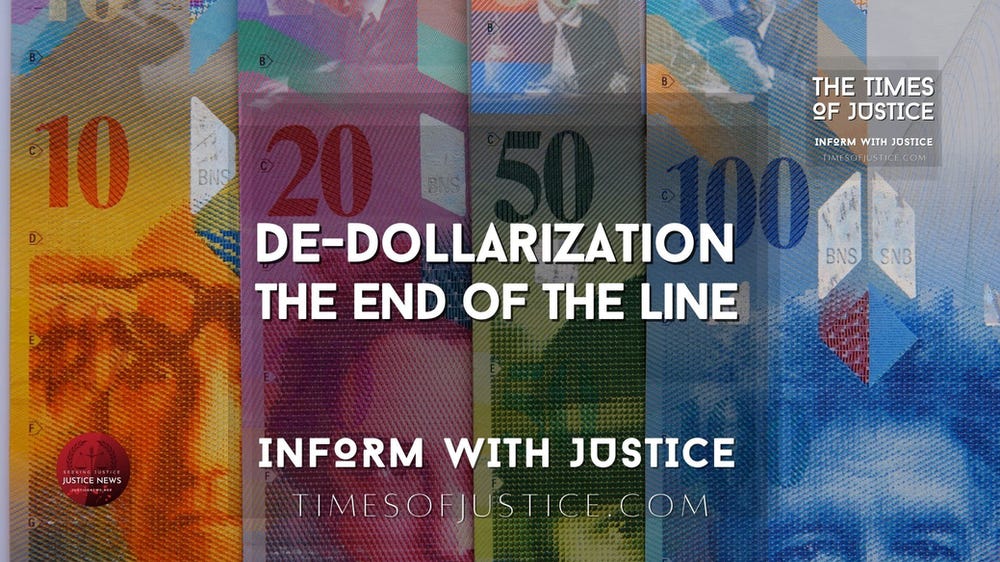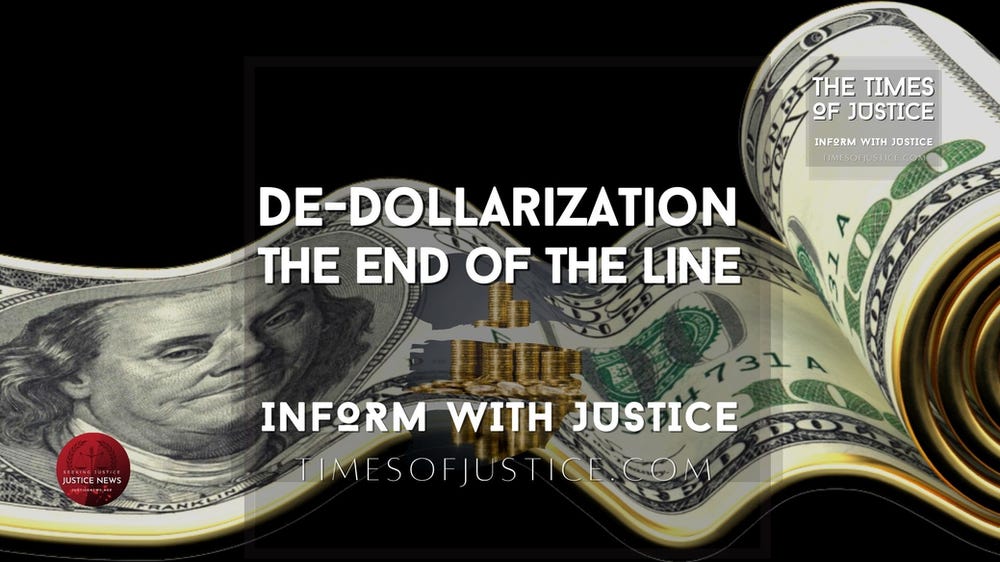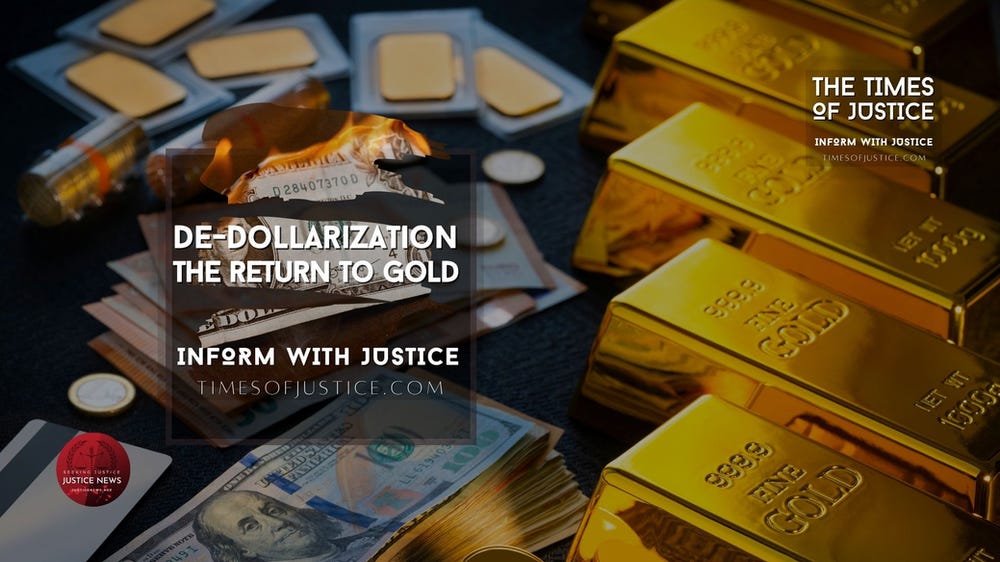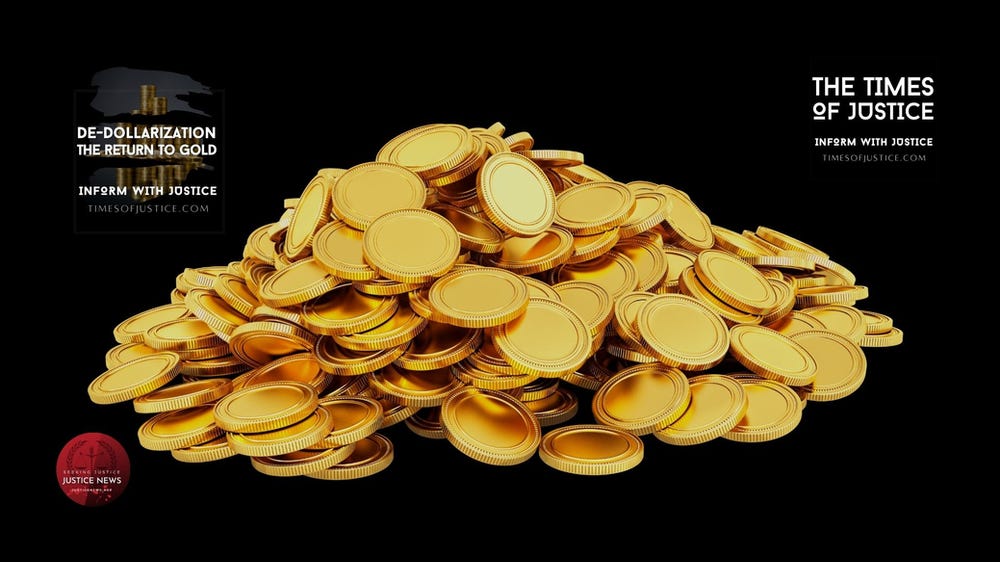De-Dollarization - The End Of The Line - And The Eventual Return To The Gold Standard
The U.S. dollar has been the dominant global currency for decades, and many countries have used it as a preferred currency for international trade, transactions, and reserves. However, in recent years, there has been a growing trend towards de-dollarization, where countries seek alternatives to the U.S. dollar. This trend is driven by various factors, including the U.S.'s use of the dollar as a tool for sanctions and diplomacy, its large trade deficits and debt burden, and the rise of China as a global economic power.
6 April 2023 | Imran Siddiqui | Justice News | Washington D.C.
What is the U.S. dollar and What is it backed with?
The U.S. has been playing around with the “Dollar” since the 1700s, which resulted as a by-product of the U.S. Mint Act of 1792 and its subsequent implementation of the coinage system. The dollar has been redesigned multiple times over centuries until eventually it was robbed of its gold standard in the 1970s and is now backed with just “Debt”. Basically rendering it, worthless. It's only as good as you believe in a travesty.
The dollar is not currently backed by a physical commodity, such as gold, as it was in the past. Instead, it is a fiat currency, which means that its value is not backed by a material thing, but rather by the trust or faith that people have in the U.S. government and economy.
So in simple words, the actual value of a U.S. dollar is = “0”.
The U.S. dollar's value is primarily determined by a vicious system called “Market Demand and Supply” not the basic humanistic policy of, “Supplying the Needs and Demands of People” But by milking them and keeping them enslaved. The demand-supply system hoards natural resources, and the stability of the dollar depends on the policies and actions of the U.S. Federal Reserve, which is the central bank of the United States, a consortium of banks, a private entity, and with no oversight. A robbery in daylight.
Why was gold removed as a backing instrument to the U.S. dollar? what are the consequences of abandoning the gold standard?
When you give up the gold standard, basically what you're saying, is that you want a lower or worse standard. Well, that's what you have right now.
The gold standard was a monetary system in which a country's currency was directly convertible to a fixed amount of gold. Under this system, the value of a country's currency was determined by the amount of gold it held. The United States was on the gold standard until 1971 when President Nixon removed the dollar's convertibility to gold. This move was attributed to a number of factors, including the growing trade deficit, the cost of the Vietnam War, and pressure from foreign governments to redeem U.S. dollars for gold. None of that made sense and the proof is in right front of you. Look at your own pockets.
Since the abandonment of the gold standard, there have been negative consequences for the U.S. economy and the global financial system. Here are some examples:
Inflation: Without the gold standard to limit the amount of money that could be printed, governments and central banks could print as much money as they wanted, which led to inflation. Inflation reduces the purchasing power of a currency and can hurt the economy by reducing consumer confidence and investment. And that's exactly what has happened.
Debt: Without the gold standard, governments were able to borrow more money than they could pay back, which led to increased debt levels. The U.S. government debt has risen enormously since the abandonment of the gold standard, and this has led to concerns about the sustainability of the U.S. economy, and it shows.
Currency instability: The floating exchange rates that followed the abandonment of the gold standard have led to currency instability and volatility in the global financial systems. This has made it difficult for businesses to plan and invest and grow, as they are uncertain about the value of the currencies they use for trade or if they can even access them due to blockades and sanctions, or a financial collapse.
Economic bubbles: The absence of the gold standard has led to economic bubbles, where certain asset classes became overvalued and eventually collapsed, leading to financial crises. Examples of economic bubbles that have occurred since the abandonment of the gold standard include the dot-com bubble of the late 1990s and the housing bubble of the mid-2000s and the financial crisis of 2008 and the cascading collapses of the banking sector in 2023.
Increased dependence on the U.S. dollar: Since the U.S. dollar is no longer backed by gold, its value is determined by market demand and supply, or elements that you might not even know, as well as oil, trade, stocks, and the policies and actions of the U.S. Federal Reserve. This has led to a situation where many countries are heavily dependent on the U.S. dollar, which can be a source of instability in their financial system snowballing into the global financial system.
While some might argue that the abandonment of the gold standard has brought a few benefits, such as increased flexibility in monetary policy, it has had far more negative consequences, including inflation, debt, currency instability, economic bubbles, and increased dependence on the U.S. dollar which is not backed by anything and is collapsable at the whim of the feds.
countries are looking for other alternatives to the U.S. dollar. What are the contributing factors to the growth of De-Dollarization?
Let's explore these factors in detail, along with examples of de-dollarization efforts in different parts of the world.
Use of the Dollar as a Tool for Sanctions and Diplomacy
One of the main reasons for de-dollarization is the use of the dollar by the U.S. as a tool for sanctions and diplomacy, or manipulation. The U.S. has the ability to freeze foreign assets held in dollars, making it difficult for countries to conduct international transactions. This has been seen in several instances, such as the U.S. sanctions on Iran and Venezuela, which cut off their access to the global financial system.
As a result, many countries are looking for alternative currencies to reduce their reliance on the U.S. dollar. For example, in 2014, Russia signed a currency swap agreement with China, allowing the two countries to conduct trade in their respective currencies instead of the U.S. dollar. This move was seen as a way for Russia to reduce its dependence on the dollar and protect itself from potential U.S. sanctions.
In addition, Russia has been developing its own cryptocurrency, the Cryptoruble, as a means of conducting transactions outside the U.S. dollar-dominated financial system. Similarly, Iran has been conducting transactions in other currencies, such as the euro and the Chinese yuan, to bypass U.S. sanctions.
China broke the barrier by conducting its first Liquefied Natural Gas LNG deal with UAE in 2023 using its own currency Yuan, and there are other countries in the middle east, Asia and Africa that will follow soon.
Large Trade Deficits and Debt Burden
Another reason for de-dollarization is the U.S.'s large trade deficits and growing debt burden. The U.S. has been running large trade deficits for decades, which has led to a significant accumulation of foreign-held U.S. dollars. This has given the U.S. a large amount of power over the global financial system, but it has also raised concerns about the long-term stability of the U.S. economy and the dollar.
Many countries are looking for alternatives to the U.S. dollar to reduce their reliance on the U.S. and protect themselves against potential financial instability. For example, in 2019, the European Union launched a payment system, INSTEX, to allow European companies to trade with Iran without using the U.S. dollar. This move was seen as a way for Europe to protect itself from the U.S. sanctions on Iran and reduce its dependence on the dollar-dominated financial system.
Similarly, in 2019, Russia reduced its U.S. dollar holdings and increased its gold and other currencies like the Chinese Yuan, Now importers of Russian oil pay in Rubles. Russia has been promoting the use of the Ruble in international trade and has been working to establish the Moscow Exchange as a global financial hub.
Rise of China as a Global Economic Power
The rise of China as a global economic power is also contributing to de-dollarization. China has been promoting the use of the yuan in international trade and finance and has been working to establish its currency as a global reserve currency. China has signed currency swap agreements with several countries, allowing them to conduct trade in yuan instead of dollars.
For example, in 2019, China signed a currency swap agreement with Argentina, allowing the two countries to conduct up to $18.7 billion in trade using their respective currencies. This move was seen as a way for Argentina to reduce its dependence on the U.S. dollar and protect itself from potential U.S. sanctions.
Technological advancements
Another factor driving de-dollarization is the rise of new technologies, such as cryptocurrencies and blockchain technology. These technologies provide an alternative to traditional currencies and financial systems, which can be dominated by the U.S. dollar.
The U.S. has been cracking down on cryptocurrencies and is in plans to launch its own.
For example, Venezuela has been promoting its own cryptocurrency, the Petro, as a means of bypassing U.S. sanctions. The Petro is backed by the country's oil reserves, and it allows Venezuela to conduct transactions without the need for U.S. dollars.
In addition, blockchain technology has the potential to disrupt traditional financial systems and make them more decentralized. This could reduce the power of the U.S. dollar in the global financial system. The U.S. is aware of this fact and is doing what it can to delay the mass adaptation of cryptocurrencies.
Geopolitical tensions and instability
Geopolitical tensions and instability are also contributing to de-dollarization. Many countries are seeking alternatives to the U.S. dollar as a means of reducing their dependence on the U.S. and protecting their own economies.
For example, in 2018, Turkey's currency, the lira, plummeted in value due to tensions with the U.S. over the detention of an American pastor. As a result, Turkey began promoting the use of its own currency in international trade and finance.
Similarly, Russia has been promoting the use of the ruble in international trade and finance as a means of reducing its dependence on the U.S. dollar. This is partly due to tensions between Russia and the U.S. over issues such as Ukraine and Syria. China has already challenged and changed the game.
Economic competition
Economic competition is also driving de-dollarization. As more countries seek to become global economic powers, they are promoting their own currencies and of their allies as alternatives to the U.S. dollar.
For example, the European Union has been promoting the use of the euro as an alternative to the U.S. dollar. The euro is the second-most widely used currency in the world after the U.S. dollar, and the EU has been working to increase its use in international trade and finance. EU is also working on its own digital currency. Everyone is on a digital rampage.
De-dollarization is a growing trend that is being driven by various factors, including U.S. sanctions and failed diplomacy, large trade deficits and debt burden, the rise of China and Russia as global economic powers, technological advancements, geopolitical tensions and instability, and economic competition. Many countries are seeking alternatives to the U.S. dollar as a means of reducing their dependence on the U.S. and protecting their own economies. As this trend continues, it could have significant implications for the global financial system and the role of the U.S. dollar in international trade and finance.
Was the "increased flexibility in monetary policy" worth it after reaping the negative effects of abandoning the gold standard?
This is a difficult question to answer definitively, as there are arguments on both sides. Some economists argue that the increased flexibility in monetary policy that came with abandoning the gold standard was necessary to allow governments and central banks to respond to changing economic conditions and stabilize the global financial system.
For example, during the 2008 financial crisis, central banks were able to inject massive amounts of liquidity into the system to prevent a complete collapse.
On the other hand, why did it have to occur in the first place? Why not write good policies?
Some argue that the harmful effects of abandoning the gold standard, such as inflation and economic bubbles, outweigh any potential benefits. They argue that the gold standard provided a natural check on the growth of money and credit, which helped to prevent bubbles and excesses in the financial system.
The answer to this question depends on one's perspective and values. Some people prioritize stability and predictability in the financial system and may believe that the gold standard was a necessary check on excesses. Others prioritize flexibility and the ability to respond to changing economic conditions and may believe that the current system is better suited to the needs of the global economy. But arguments get thrown out if they don't benefit the ones they are being made for. At the end of the day, the last 50 years clearly demonstrate how removing the dollar from the gold standard turned out to be a mega failure for the average people and for the government.
keeping the data and trends in view, would it not be suffice to say that the negative results outweigh the increased flexibility in monetary policy, that resulted in more harm than Benefit?
There is some evidence to suggest that the negative consequences of abandoning the gold standard, such as inflation and economic bubbles, have had a significant impact on the global economy. However, it is difficult to say definitively whether the negative consequences outweigh the benefits of increased flexibility in monetary policy.
One reason for this, critics argue, is that the global economy is incredibly complex, and there are many factors that contribute to economic growth or contraction. It is difficult to isolate the impact of any one policy or decision on the economy as a whole.
Additionally, there are differing views among economists about the benefits and drawbacks of the gold standard versus the current monetary system. While some believe that returning to the gold standard would provide a more stable and predictable financial system, others believe that it would limit the ability of governments and central banks to respond to changing economic conditions.
While there is evidence to suggest that the negative consequences of abandoning the gold standard have had a significant impact on the global economy, it is difficult to definitively say whether the negative consequences outweigh the benefits of increased flexibility in monetary policy. The debate over the merits of the gold standard versus the current system is likely to continue among economists and policymakers for the foreseeable future but it will be up to the people to decide what they want to do with their financial lives.
We are directly impacted by any negative consequences that originate from bad monetary policies.
Ultimately it is up to the people to use and act upon the right information in a way that prioritizes the well-being of individuals, their families, and society as a whole.
It is important to consider the potential consequences of bad economic policies and decisions and see if such approaches are truly for the welfare of the people, for your own self, and for your communities.
While there are differing views among economists and policymakers about the best approach to monetary policy, it is important to weigh the potential benefits and drawbacks of any policy or decision to ensure that it aligns with the best interests of the people. Many countries around the world are waking up to the harsh reality that the U.S. dollar may not even be worth a cent.
| ,Imran Siddiqui is the managing editor at ,Justice News and the author of ,The JBlog. Imran's podcast ,FairPlay Challenging Wrongful Convictions airs on ,J107,Justice Radio











